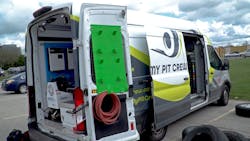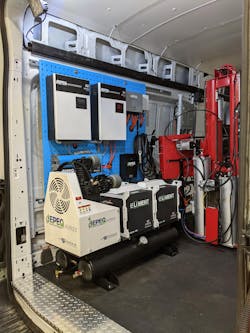Increase fuel efficiency using a fleet management system, electrified fleet products
If the industry learned one thing within the last few years, it’s that good times don’t last forever. The sky-high spot rates and the seemingly never-ending amount of freight to haul during the pandemic took a turn for the worse in 2023, causing trucking companies and owner-operators to pinch pennies wherever possible.
Areas where trucking companies found savings were in implementing fleet management systems to increase fuel efficiency and employing electrified equipment where possible.
Fuel management systems
Fuel is “one of the top four or five major costs that our customers have,” Abhishek Gupta, VP of fleet products for Motive, told FleetOwner. And because of that, “even minor, single-digit percentage changes can actually drive so much more efficiency and profitability for these businesses.”
Fleets that monitor their fuel usage may find it easier to make those changes that help increase fuel efficiency. Fleets can monitor their fuel usage through fleet management systems, and in some cases, these systems can discover operational and fuel inefficiencies to help fleets increase their fuel efficiency even more.
“I think the first step is really understanding where are you seeing the inefficiency in … technology today.” And, when it comes to emissions efficiency, Gupta said there are a few things that really stand out to him and his team from a technology standpoint.
Motive, a unified, integrated fleet operations platform, helps fleets become safer, more profitable, and more efficient, according to Gupta. One way the company helps improve fuel efficiency for fleets is with its Fuel Hub platform. The Fuel Hub tracks fuel consumption across a fleet and logs it per driver and per vehicle, offering fleet managers a view into fuel use history, MPG, and idling trends.
The Fuel Hub helps fleet managers understand whether their trucks are traveling the most efficient routes and how to better route vehicles so that they are getting the highest efficiency from an emissions standpoint, as well as whether the MPG received by a fleet vehicle is the optimum MPG that vehicle can obtain.
This is possible through the Fuel Hub’s ability to compare a specific fleet’s vehicles with vehicles across its entire network—even down to a certain make and model. For instance, if a Freightliner Cascadia in one Motive customer’s fleet gets significantly less fuel mileage than the average Cascadia across the Motive network (referred to as the “benchmark”), Motive will provide insights into what is causing that efficiency gap for that specific fleet truck.
Those efficiency gaps could be closed through several ways: “Better driving practices, sharing (with) them the insight on the routes, coaching their drivers, helping them identify how to do less idling … and giving them access to benchmark data,” Gupta said.
Motive customers that have used the Fuel Hub tool have found savings of 10 to 12.5%, Gupta said.
EPEQ AIR20
Another way to improve fuel efficiency is to use battery-electric equipment when possible. AAA’s Hoosier Motor Club implemented this technology in its mobile tire fleet using a battery-powered air compressor. Three vans in the fleet are equipped with the AIR20 air compressor from Vanair’s EPEQ electrified product line. The AIR20 provides 20 CFM at 150 PSI running off of Vanair’s standard 100-amp LiFePO4 ELiMENT battery.
Joel Hargrave is the Hoosier Motor Club business development manager. He runs the mobile tire division, which is essentially a tire shop on wheels that services customers at their homes, their jobs, or wherever the road takes them.
Hargrave chose to install the EPEQ system in his vans, equipped with tire changers and balancers inside them, because “we can service a varied amount of customers with a sleek van that has a nice appearance—(and it) isn't making a lot of noise. It isn't dangerous for our technicians on the inside to breathe smoke and what have you trying to run an ... internal combustion engine generator.”
The Hoosier Motor Club is based in Indiana, and Hargrave said they chose to use the EPEQ system from Vanair, another Indiana-based company, because “we try to keep it as close to home as we can.” The proximity also gave Hargrave the opportunity to visit the Vanair facility and see how the EPEQ equipment is made.
Aside from location proximity, Hargrave said Vanair sent out its strategic accounts manager, Chip Jones, to give Hargrave and his team an overview of the system, walking them through the benefits of the system and its expandability.
"They showed us everything before we ever actually committed to it,” Hargrave said. “They committed to being good partners for us, so there were a lot of personal touches there that that drew us to (the EPEQ system).”
Hargrave told FleetOwner his technicians can do a whole day’s work on one charge, and the system also charges from the vehicle’s alternator for worry-free operation when the workload is hefty.
There are no idling laws where Hargrave’s fleet of mobile tire vans operate. However, the fact that the vans don’t have to idle during a job—and the fact that the generators run off a battery instead of fuel— contribute to increased fuel efficiency.
About the Author
Jade Brasher
Senior Editor Jade Brasher has covered vocational trucking and fleets since 2018. A graduate of The University of Alabama with a degree in journalism, Jade enjoys telling stories about the people behind the wheel and the intricate processes of the ever-evolving trucking industry.


